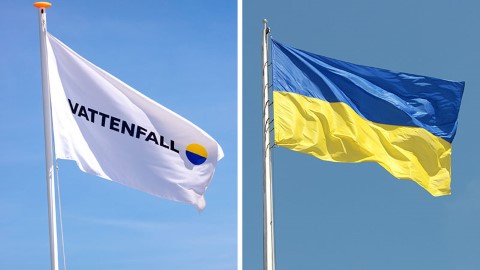On Thursday morning war broke out in Europe. Vattenfall’s President and CEO Anna Borg, comments on the situation.
By Markus Friberg

Anna Borg, what is your reaction to Russia’s invasion of Ukraine on Thursday morning?
It is a clear breach of international law and Europe is now facing the worst geopolitical situation since the Second World War. Like most others I had hoped that the crisis that has been building up over the past months would not escalate to this. It is a terrible tragedy that we now see, with a war on European soil and I can’t imagine the fear and anguish the people in Ukraine now are facing. We stand with them in this difficult moment.
Many in our company have close ties to Ukraine and even have family there, I especially think about them.
What is Vattenfall doing now?
It is hard to predict how this conflict will develop. We are monitoring the situation as closely as we can and continuously assess the effects on our company and our customers. There are both business and security aspects that we take very seriously and deal with in a structured way and we are taking measures and assess risks when it comes to securing our energy production, distribution operations and IT security.
Will we stop doing business with Russian companies?
We have business relationships with a number of Russian counterparties that we source fuels from or trade with on energy wholesale markets.
For Nuclear Fuels, Vattenfall has decided that, until further notice, no planned deliveries of nuclear fuel from Russia to our nuclear power plants will take place and that we will also not place any new orders from Russia. Instead we have secured alternative deliveries of nuclear fuel and thereby also secured the power production in our nuclear power plants.
For coal we are taking steps to further diversify our sourcing portfolio.
Vattenfall does not have any long term gas contracts with Russian counterparties. We purchase natural gas at the individual trading hubs and thereby a mix of the total supply in Europe. 40 per cent of the natural gas that is sold in Europe comes from Russia. Other main supplier countries are Norway, the Netherlands, as well as an increasing number of LNG shipments into Europe.
We will of course follow any additional sanctions that are imposed on Russia and have an impact on Vattenfall.
What are the main business risks that Vattenfall is facing due to the war?
In general, the uncertainty and unpredictability this creates globally is of course not good and we don’t know where this will end. That’s why we are now preparing for different scenarios in all parts of our business, which I also mentioned earlier.
There is the risk of increasing prices for energy. With our optimisation and trading activities we aim to reduce this risk.
Secondly there is the replacement risk. In case gas deliveries from Russia would no longer reach the European market, other sources would have to be used to secure enough gas in Europe. This is also valid for other fuels such as coal.
Thirdly there is a counterpart risk. It is currently not possible to determine the impact on the counterparties Vattenfall transacts with and we monitor this carefully.
How will the war affect energy prices on the wholesale market and what are your expectations going forward?
The Russian invasion introduces uncertainty into the commodity markets and we have witnessed a significant price rise across nearly all gas contracts since Thursday. We can expect a volatile market. This will also depend on the announced sanctions against Russia.
Will the prices for customers also rise?
While the energy prices on the wholesale market are going up, this does not necessarily mean the energy bills for customers will go up. It is too early to tell how this will develop over time. However, if gas prices will remain high over a longer period of time, this will very likely lead to higher energy prices for customers.
In markets such as the Netherlands, Germany and the UK millions of customers are depending on gas to heat their homes. Will the gas storages suffice?
There is enough gas in European stocks to meet winter demand given the current weather forecasts. Europe will at some point have the requirement to start to replenish stocks over the summer which could be more difficult if no solution is found.


